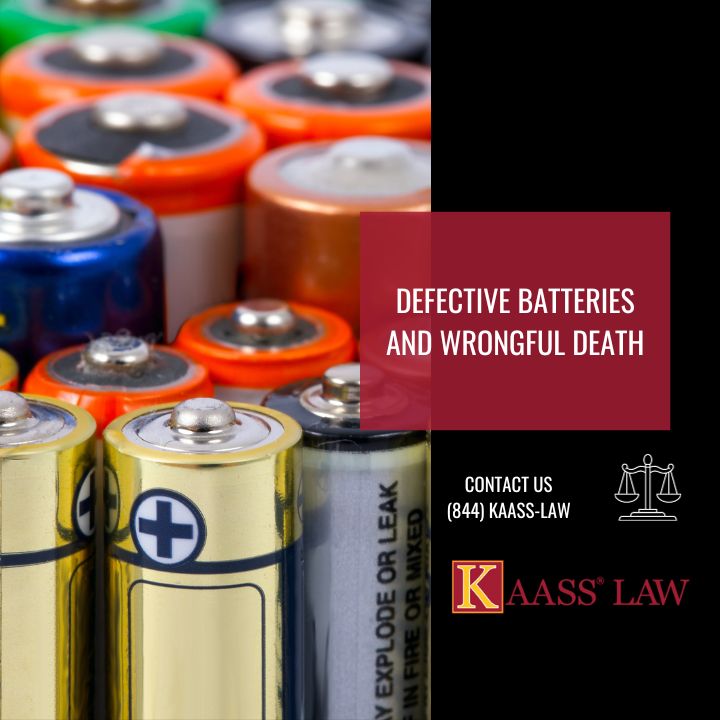Whether we know it or not, batteries are a part of our everyday lives. Batteries are in our cellphones, computers, and cars. With the use of them, we have a great deal of functionality for the daily lives of ours. Batteries are great, until one of them malfunctions, which can result in death. Such defects may result in tragedy.
The Pervasiveness of Batteries
People have used batteries for hundreds of years. What was originally invented for electrical storage has now become today’s leading versatile portable energy storage solution. From powering your smartwatch to storing renewable energy for the grid, batteries quietly empower our technology-driven world.
The Unseen Threat
Beneath their everyday utility, batteries can pose a substantial threat, particularly when they are flawed. A defective battery can malfunction in various ways, from overheating to spontaneous combustion and even outright explosions. When these malfunctions occur, the consequences can be devastating, occasionally leading to wrongful death.
Varieties of Defective Batteries
There are several varieties of defective batteries that may lead to physical injury, or worse, death. Find the list below of such defects in batteries:
- Lithium-ion Batteries: These batteries are widely employed in smartphones, laptops, and an array of electronic devices. Notorious for their tendency to overheat, lithium-ion batteries can, in certain cases, ignite, resulting in tragic outcomes.
- E-cigarette Batteries: Vaping devices, for example, are rechargeable batteries that are power operated. If a malfunction occurs with such portable batteries, they can blow up, resulting ion personal injury or wrongful death.
- Hoverboard Batteries: Wrongful death may occur from the cause of failure of the hoverboard scooters. With popularity being at its peak up until today, many people still experience faulty malfunctions caused by the defective battery systems.
- Electric Vehicle Batteries: Fires and death may be caused from a battery malfunction in an environment safe vehicle, such as an electric vehicle. With high voltage batteries, comes bigger problems if there is a defect in the product, especially.
- Consumer Electronics: Electronics we use daily are battery operated. It is not rare for the batteries to explode, leading to harsh results following an accident.
The Ramifications of Defective Batteries
The outcomes resulting from faulty batteries include:
- Fires
- Explosions
- Chemical Burns
- Smoke Inhalation
Battery malfunctions are not as rare as one may think. It is important to understand that fires are likely to happen after a battery explosion. Although there could be batteries that are not explosive, they may increase in heat, which intern, can cause harm.
Preventive Measures and Safety Standards
Preventing wrongful deaths caused by defective batteries necessitates a multi-pronged approach, which includes:
- Battery Testing and Certification: Manufacturers must test batteries before selling them to consumers or other manufacturers.
- Enhanced Quality Control: To prevent mishaps, manufacturers should follow guidelines when adhering to protocols before introducing products to consumers.
- Advancements in Battery Design: While manufacturers may have previously tested and approved batteries, it is crucial for them to ensure the future safety of the product
- Raising Consumer Awareness: As manufactures test the batteries, they are able to provide their consumers with the correct protocol to follow, in order to potentially avoid any mishaps in the future of that battery.
- Enforcement of Government Regulations: By staying up to date with the new safety regulations, the manufacturers are able to provide their consumer with a safe use of their product.
Legal Implications
Wrongful deaths stemming from defective batteries can lead to intricate legal cases. Determining liability often involves investigating the entire supply chain, from the battery manufacturer to the product manufacturer and the retailer. Product liability laws hold various parties responsible for the defective product, and wrongful death claims aim to provide compensation to the victim’s family.
Defective batteries present a hidden danger in our contemporary world of convenience and technology. While they power our devices and enhance our lives, they can also bring about tragedy when they malfunction. Wrongful deaths stemming from defective batteries serve as a stark reminder of the necessity for safety, accountability, and continuous improvement within the battery industry. As consumers, it is our duty to remain vigilant, demand safer products, and understand our legal rights to seek justice in the event of a tragic loss caused by a defective battery.
Additionally, visit this link to learn more about our other practice areas. We can help you get the compensation you deserve!

